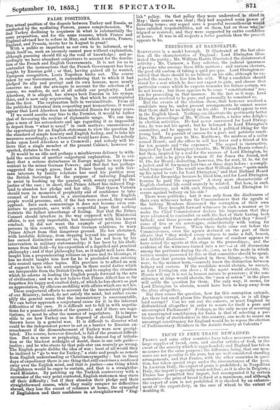EBRINGTON AT BARNSTAPLE.
BARNSTAPLE is a model borough. It illustrated at the last elec- tion all the characteristics of England : Lord Ebrington illus- trated the purity ; Mr. William Harris illustrated the disinterested activity ; Mr. Carnsew, a Tory solicitor, the judicial ignorance of .persons who arrange these little matters ; and various electors, the good old custom of taking a quid pro quo. Lord Ebrington re- solved that there should be no bribery on his side, although he ex- pected the resolve to lose him his seat. Why a candidate should stand for a seat which he does not expect to gain, and choose that particular course which he expects to render his failure certain, we do not know ; but there appears to be some "constitutional" rea- son for proceeding in that manner. Be the fact as it may, Lord Ebrington resolved to be pure, and personally he remained so. But the events of the election show, that however resolved a candidate may be, under present arrangements he cannot secure that there shall be no bribery on his side. It would appear to run in the English blood. Nothing can illustrate the pertinacity better than the proceedings of Mr. William Harris, a tailor who delights in election activities. Ile had never canvassed for Lord Ebring- ton ; he was not his agent; but he belonged to Lord Ebringtou's committee, and he appears to have had a political liking for the young lord. In pursuit of success for a pure and patriotic candi- date, Mr. Harris goes to Mrs. Matthews, the mistress of a sailor named Heard ; and she offers to sell her lover and a friend of his for ten pounds and "the expenses." The sequel is instructive. Inspired by Lord Ebrington's resolve, Mr. William Harris refused ; but then, inspired by a zeal for the success of Lord Ebrington, he agreed ; and so he gives the woman 5/. for Jones the friend, and I Si. 10s. for Heard ; deducting, however, 10s. for rent, 1/. 5s. 6d. for a jacket, and 3/. for money lent two or three days before : a compli- cated transaction ! The result was that William Jones "quite made up his mind to vote for Lord Ebrington," and that Richard Heard "voted for Bremridge because he liked him, and for Lord Ebrington because he paid the expenses." A story more characteristic of English electoral life could scarcely be related. But how, in such a constituency, and with such friends, could Lord Ebrington be secure against bribery on his side ?
There were petitions ; but it was only from the disclosures of their own witnesses before the Commissioners that the agents of the bribing Members discovered the corruption of their own voters. They brought forward witnesses in such a manner as to make the Chief Commissioner declare his impression that they were advanced to contradict on oath the fact of their having been bribed ; and those persons afterwards admitted that they " found " sums of five or six sovereigns, coincidentally with voting for Bremridge and Fraser. When these facts came out before the Commissioners, even the agents declared on the part of their clients that "they wished every witness to make a full, honest, and faithful disclosure." A certain furor of candour appears to have seized the agents at this stage in the proceediugs ; and the - evidence of the witnesses turned into a revsl•ai of 91d discussions among the partisans during the eleons, as to the mode in which certain monies possessed by this or that committee should be spent. It is clear that persons implicated in these things,—being, as it I were, to the manner born,—scarcely know the distinction between ' bribery and custom. If the candidate would abstain, he cannot, as Lord Ebrington can show ; if the agent would abstain, Mr. Harris will say it is not in human nature to persevere ; if the con- stituency at large would abstain, the "men of action" in the place will settle the question for them. The only way, it seems, for Lord Ebrington to abstain, would have been to keep away from the place altogether.
But then comes the question, how far this corruption extends. Are there but small places like Barnstaple corrupt, or is all Eng- land corrupt? Can we cut out the cancers, or must England be i disfranchised altogether in order to secure for itself a pure and uncorrupted Parliament? Perhaps, as the only means of securing an uncorrupted constituency for India is that of selecting a par- ticular body of stockholders in this country, one mode to secure an uncorrupt constituency for England would he to repose the election of Parliamentary Members in the Asiatic Society at Calcutta ?


























 Previous page
Previous page